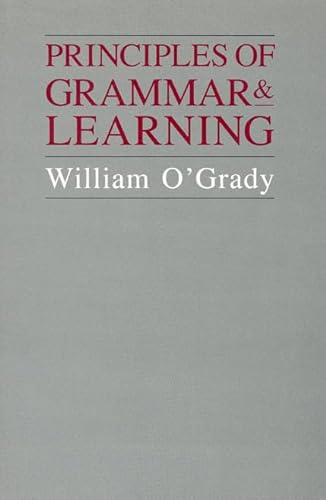Items related to Principles of Grammar and Learning

Synopsis
Principles of Grammar and Learning is concerned with the nature of linguistic competence and with the cognitive structures underlying its acquisition and use. During the past several decades many linguists and psychologists have come to the conclusion that genetically determined categories and principles specific to language are needed to account for the form and acquisition of grammatical systems. William O'Grady argues here for quite a different conclusion, proposing that adequate grammars can be constructed from a conceptual base not specific to language.
To support this thesis, O'Grady develops a well-articulated, single level, categorial-type grammar that he uses to analyze syntactic categories, extraction, anaphora, extraposition, and quantifier placement in English and other languages. He shows that such grammars can be constructed via general learning strategies from notions such as dependency, adjacency, precedence, and continuity, and that the available acquisition data points to the emergence of the principles he proposes.
While exploratory, this book provides one of the few serious attempts to develop a theory of grammar and learning that does not posit faculty-specific innate principles. Principles of Grammar and Learning is an exemplary attempt to bring together issues and data from syntactic theory, language acquisition, and the more general study of the human mind.
"synopsis" may belong to another edition of this title.
About the Author
William O’Grady is associate professor of linguistics at the University of Calgary.
From the Back Cover
Some twenty-five years ago the discipline of linguistics embarked on a research program aimed at identifying the grammatical rules underlying human linguistic knowledge as well as the mental structures that make possible their acquisition. For the most part, this research has been based on two central assumptions: the view that grammatical notions are not constructed on a semantic base (the autonomy thesis) and the view that central components of the grammar are innate (nativism). In this book I will undertake to question the validity of each of these assumptions, proposing in their place an alternate conception of the nature of grammatical notions and of linguistic development.
"About this title" may belong to another edition of this title.
- PublisherUniversity of Chicago Press
- Publication date1987
- ISBN 10 0226620743
- ISBN 13 9780226620749
- BindingHardcover
- LanguageEnglish
- Number of pages248
US$ 3.99 shipping within U.S.A.
Destination, rates & speedsSearch results for Principles of Grammar and Learning
Principles of Grammar and Learning
Seller: Books From California, Simi Valley, CA, U.S.A.
Hardcover. Condition: Good. Seller Inventory # mon0002756134
Quantity: 1 available
Principles of Grammar and Learning
Seller: Midtown Scholar Bookstore, Harrisburg, PA, U.S.A.
Hardcover. Condition: Good. Good - Bumped and creased book with tears to the extremities, but not affecting the text block, may have remainder mark or previous owner's name - GOOD Standard-sized. Seller Inventory # M0226620743Z3
Quantity: 2 available
Principles of Grammar and Learning
Seller: Alphaville Books, Inc., Hyattsville, MD, U.S.A.
Hard Cover. Condition: Very Good. Dust Jacket Condition: Very Good. Clean. Seller Inventory # 22065
Quantity: 1 available
Principles of Grammar and Learning
Seller: Book House in Dinkytown, IOBA, Minneapolis, MN, U.S.A.
Hardcover. Condition: Very Good. Dust Jacket Condition: Good. Copyright 1987. Hardcover. Dust jacket worn at head and heel. Else good. Seller Inventory # 184795
Quantity: 1 available
Principles of Grammar and Learning
Seller: HPB-Ruby, Dallas, TX, U.S.A.
hardcover. Condition: Very Good. Connecting readers with great books since 1972! Used books may not include companion materials, and may have some shelf wear or limited writing. We ship orders daily and Customer Service is our top priority! Seller Inventory # S_410486198
Quantity: 1 available
Principles of Grammar and Learning.
Seller: Kloof Booksellers & Scientia Verlag, Amsterdam, Netherlands
Condition: very good. Chicago : University Of Chicago Press, 1987. Hardcover. Dustjacket. 248 pp.- Principles of Grammar and Learning is concerned with the nature of linguistic competence and with the cognitive structures underlying its acquisition and use. During the past several decades many linguists and psychologists have come to the conclusion that genetically determined categories and principles specific to language are needed to account for the form and acquisition of grammatical systems. William O'Grady argues here for quite a different conclusion, proposing that adequate grammars can be constructed from a conceptual base not specific to language. To support this thesis, O'Grady develops a well-articulated, single level, categorial-type grammar that he uses to analyze syntactic categories, extraction, anaphora, extraposition, and quantifier placement in English and other languages. He shows that such grammars can be constructed via general learning strategies from notions such as dependency, adjacency, precedence, and continuity, and that the available acquisition data points to the emergence of the principles he proposes.English text. Condition : fine & unread. Condition : very good copy. ISBN 9780226620749. Keywords : LINGUISTICS, Seller Inventory # 51991
Quantity: 1 available
Principles of Grammar and Learning
Seller: The Book Spot, Sioux Falls, MN, U.S.A.
Hardcover. Condition: New. Seller Inventory # Abebooks31601
Quantity: 1 available
Principles of Grammar and Learning Format: Hardcover
Seller: INDOO, Avenel, NJ, U.S.A.
Condition: New. Brand New. Seller Inventory # 9780226620749
Quantity: Over 20 available
Principles of Grammar and Learning
Seller: GreatBookPrices, Columbia, MD, U.S.A.
Condition: New. Seller Inventory # 1527824-n
Quantity: 15 available
Principles of Grammar and Learning
Seller: GreatBookPrices, Columbia, MD, U.S.A.
Condition: As New. Unread book in perfect condition. Seller Inventory # 1527824
Quantity: 15 available
